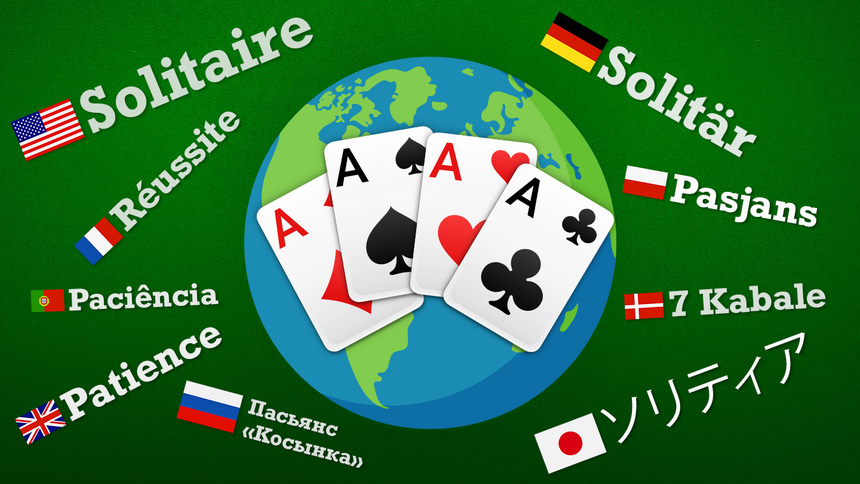Solitaire in Different Cultures: What's In a Name?

Solitaire, the classic card game enjoyed by millions, goes by many names across the globe, each reflecting its own cultural twist. Whether you play to relax or challenge your mind, this classic game has captured countless hearts, taking on different names in many countries.
What are the Variations of Solitaire's Name?
In the United States, the game is universally known as "Solitaire". This term comes from the French word "solitaire," meaning "solitary" or "alone", fitting for a game often played solo. The game's popularity soared when "Klondike Solitaire" was featured in Microsoft Windows 3.0 back in 1990. Initially, it was designed as a fun way to help new users learn how to use a mouse, which was a novel tool for many at the time. While this idea might seem odd now, during that era, computers predominantly relied on command-line interfaces that required only a keyboard.
In the United Kingdom, the game is widely known as "Patience." This name highlights the careful strategy and patience needed to win. It gained massive popularity during the Victorian era, especially among the upper class. Queen Victoria's husband, Prince Albert, was particularly fond of the game, and it frequently appeared in literature of the time, including in Charles Dickens' "Great Expectations".
In France, the game known as Solitaire is also called "Patience" and "Réussite." "Solitaire" highlights playing the game alone. "Patience" points to the careful thinking needed to win, and "Réussite", which means "success", focuses on the goal of sorting the deck correctly. It is believed that Solitaire became widely popular in France, often mentioned in literary works from the early 19th century. Celebrated for requiring strategic thinking and calm focus, Solitaire holds a special place in French culture. The game quickly spread across Europe, becoming a beloved pastime for people from various social classes.
In Germany, people call the game "Solitär", which comes from the word "solitaire". Another name for it is "Patience," reflecting both French and English influences on the game. This dual name shows how cultural exchanges have shaped popular pastimes, with "Solitär" becoming a favorite for those who enjoy a quiet and thoughtful challenge.
In Denmark, the game goes by the name "7 Kabale", where "kabale" means "cabal" (secret knowledge) or "intrigue." This term suggests a connection to the mystical practices of card layouts or 'tableau' that may have origins in fortune-telling, popular in mid-1700s Europe. The game could have been used to predict the success of personal endeavors or promises, with a successful game indicating a favorable outcome.
The "7" in the name comes from the seven columns of cards dealt at the start, highlighting the game's strategic nature. "7 Kabale" became widely popular in Denmark in the early 20th century, often played in social clubs and gatherings. Its spread in Danish culture was helped by its popularity across Scandinavia and other parts of Europe.
Portuguese players call the game "Paciência", which means "patience" in English and highlights the thoughtful and deliberate approach needed to play the game. In both Spain and Italy, the game is known as "Solitario", which directly translates to "Solitaire" and refers to its solitary nature, making it a perfect choice for those looking for a quiet way to pass the time.
In Russia, the game is widely known as "Пасьянс «Косынка»" (Pasyans "Kosynka"), meaning Solitaire "Kerchief". The name "Kosynka" comes from the way cards are arranged to resemble a small kerchief, a style rooted in traditional Russian card games.
In Poland the game is called "Pasjans". The name reflects the historical French influence during the 18th and 19th centuries when French was widely spoken in European diplomacy and culture. In French, "patience" describes the game’s need for careful planning and calmness as players arrange the cards. This essence is preserved in the Polish adaptation of the name, emphasizing the game's considerate nature.
In Japan, the game is called "ソリティア" (Soritia), which is a direct transliteration of the English word "Solitaire." This name illustrates the strong influence of Western culture on modern Japanese entertainment and gaming. It is believed that Solitaire made its way to Japan in the early 20th century and became extremely popular after World War II. As digital technology advanced, Solitaire's popularity continued to grow, firmly embedding it in Japanese cultural activities.
Solitaire is a Worldwide Game
From the "Patience" of the UK to the "Réussite" of France, and the strategic "7 Kabale" in Denmark, Solitaire’s different names highlight its global appeal and cultural adaptations. This game not only serves as a bridge across cultures but also remains a beloved pastime that continues to help keep players' minds sharp and entertain card enthusiasts around the world.


